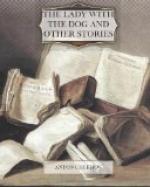He felt intense irritation, and to avoid saying too much, he got up quickly and went into the house. It was still, and the fragrance of the tobacco plant and the marvel of Peru floated in at the open window. The moonlight lay in green patches on the floor and on the piano in the big dark dining-room. Kovrin remembered the raptures of the previous summer when there had been the same scent of the marvel of Peru and the moon had shone in at the window. To bring back the mood of last year he went quickly to his study, lighted a strong cigar, and told the footman to bring him some wine. But the cigar left a bitter and disgusting taste in his mouth, and the wine had not the same flavour as it had the year before. And so great is the effect of giving up a habit, the cigar and the two gulps of wine made him giddy, and brought on palpitations of the heart, so that he was obliged to take bromide.
Before going to bed, Tanya said to him:
“Father adores you. You are cross with him about something, and it is killing him. Look at him; he is ageing, not from day to day, but from hour to hour. I entreat you, Andryusha, for God’s sake, for the sake of your dead father, for the sake of my peace of mind, be affectionate to him.”
“I can’t, I don’t want to.”
“But why?” asked Tanya, beginning to tremble all over. “Explain why.”
“Because he is antipathetic to me, that’s all,” said Kovrin carelessly; and he shrugged his shoulders. “But we won’t talk about him: he is your father.”
“I can’t understand, I can’t,” said Tanya, pressing her hands to her temples and staring at a fixed point. “Something incomprehensible, awful, is going on in the house. You have changed, grown unlike yourself. . . . You, clever, extraordinary man as you are, are irritated over trifles, meddle in paltry nonsense. . . . Such trivial things excite you, that sometimes one is simply amazed and can’t believe that it is you. Come, come, don’t be angry, don’t be angry,” she went on, kissing his hands, frightened of her own words. “You are clever, kind, noble. You will be just to father. He is so good.”
“He is not good; he is just good-natured. Burlesque old uncles like your father, with well-fed, good-natured faces, extraordinarily hospitable and queer, at one time used to touch me and amuse me in novels and in farces and in life; now I dislike them. They are egoists to the marrow of their bones. What disgusts me most of all is their being so well-fed, and that purely bovine, purely hoggish optimism of a full stomach.”
Tanya sat down on the bed and laid her head on the pillow.
“This is torture,” she said, and from her voice it was evident that she was utterly exhausted, and that it was hard for her to speak. “Not one moment of peace since the winter. . . . Why, it’s awful! My God! I am wretched.”
“Oh, of course, I am Herod, and you and your father are the innocents. Of course.”




